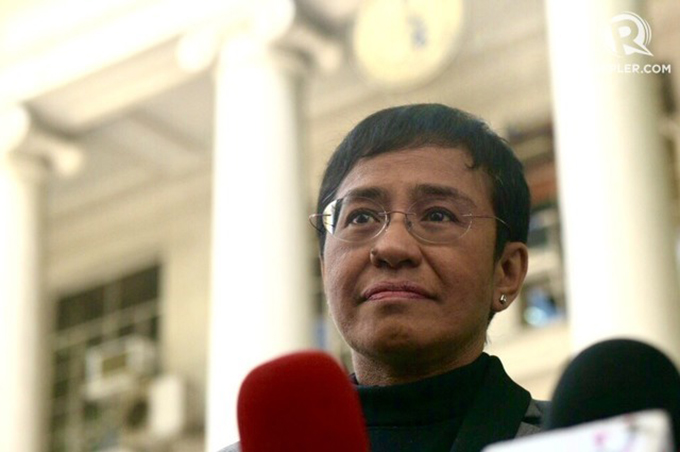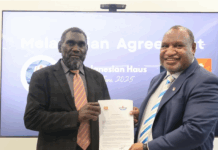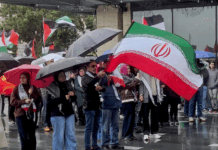Golden Pen winner Maria Ressa talks about “government impunity” over “war on drugs” killings and social media hate speech. Video: Rappler
Pacific Media Watch Newsdesk
Rappler executive editor and CEO Maria Ressa has won a coveted press freedom award from a 70-year-old global network of news publishers seeking to uphold the rights of journalists worldwide.
Ressa received the Golden Pen of Freedom Award from the World Association of Newspapers and News Publishers (WAN-IFRA) in Portugal last week.
In her acceptance speech, Ressa said: “My heart breaks when I look at what our young reporters and staff have to live with – and the courage they show in the face of brute force and impunity… the respect they continue to show authorities, the nightmares they fight at night, the mission that lives inside them.
READ MORE: The full text of Maria Ressa’s acceptance speech
“But this award goes beyond Rappler,” she continued.
“For the Filipino journalists in the audience, please stand up. This is for all Filipino journalists just trying to do our jobs.”

The Rappler CEO also said that “the Golden Pen of Freedom also goes beyond journalists in the age of social media. So this award is also for Filipinos who are holding the line … And I want to do a special shout-out to the men and women inside the Philippine government – because your choices, every compromise you make, will determine the future of our nation,” she said.
‘Fighting for our values’
“This is for all Filipinos who continue to fight for our values – to stand for the rule of law and to defend press freedom!” added Ressa as she received the WAN-IFRA award to a standing ovation.
Founded in 1948, WAN-IFRA is an organisation whose members represent 18,000 publications across 120 countries, including the Philippines and New Zealand. Its mission is “to protect the rights of journalists around the world to operate free media.”
The Golden Pen of Freedom is WAN-IFRA’s annual award that aims “to turn the spotlight of public attention on repressive governments and journalists who fight them”.
WAN-IFRA said that “often, the laureate is still engaged in the struggle for freedom of expression and the Pen has, on several occasions, secured the release of a publisher or journalist from jail or afforded him or her a degree of protection against further persecution”.
The award comes as Rappler faces attacks from the Duterte administration due to its fearless reportage of the government’s war on drugs, human rights abuses, and other controversies, prompting President Rodrigo Duterte to condemn it as “fake news”.
This is the latest in a series of international awards won by Rappler and Ressa over the past year, including the following:
- The 2018 Knight International Journalism Award from the International Center for Journalists
- The award for Data Journalism Website of the Year from the Global Editors Network
- The Free Media Pioneer Award from the International Press Institute
- The W. Averell Harriman Democracy Award from former US secretary of state Madeleine Albright’s National Democratic Institute
In solidarity with Rappler
David Callaway, president of the World Editors Forum, described Ressa as “a genuinely courageous journalist, a dedicated media pioneer, and a true believer in the power that the craft of journalism can have.”
Callaway is former editor in chief of USA Today, one of the largest newspapers in the United States. He is now CEO and editor emeritus of TheStreet, a 22-year-old American source of financial news.
Callaway said in his speech introducing Ressa: “We’re here to stand in solidarity with her and her news organization as together they face immense pressures, deeply personal attacks, and orchestrated attempts to undermine the professionalism and credibility of a news brand that has captured the public imagination and truly embraced what it means to be ‘social’ in this digital media age.
“We’re here to denounce the incessant online attacks against a woman who has navigated war zones and reported from conflict areas, and yet who concedes that never before has she faced a challenge so large, so all encompassing, in terms of what she has been subjected to over recent years from the anonymous online troll armies of her opponents and critics,” he added.
Callaway cited how “officials in at least 8 government agencies have attacked Rappler,” while “a number of open investigations and court decisions” remain pending.
Callaway said: “We hope that by awarding the Golden Pen of Freedom to Maria Ressa, the Philippine government will pause before it considers its next move, that it takes stock of what its actions mean for the democratic future of the country and its millions of people.
“A free media is the sign of a strong, confident political system, one that trusts its people and has understood the electoral bargain. Encouraging criticism and participation ensures accountability, something President Duterte should understand.
“We hope the Golden Pen also deters those who seek to undermine media independence and the profession of journalism by showing the solidarity that the award represents. When all else fails, we should know that we have each other to rely upon if we are to continue making the kind of impact, breaking the sort of stories, and shining our light into those dark corners in a way our communities have come to expect. The way Rappler has been doing, and will keep on doing,” he added.
‘Existential moment for Rappler’
As she received the award, Ressa said Rappler had been “fighting impunity on two fronts” for the past two years.
She mentioned impunity in government, “which is fundamentally changing our Constitution and our way of life starting with a brutal drug war.”
She also cited impunity on Facebook.
“We know its best and worst: it enabled Rappler’s fast growth and also later became the battleground for online state-sponsored hate to silence critical voices and – in David’s words – to ‘occupy’ the public space.”
The Rappler CEO cited how the Philippine government changed the drug war figures in the first 3 months of Duterte’s anti-drug campaign – “slicing and dicing people and numbers, demanding we report only what they say.”
She said that simultaneously, “journalists were battered into submission by unrelenting, orchestrated attacks on Facebook.”
Death toll ‘first casualty’
“That death toll was the first casualty in our war for truth,” Ressa said.
She also pointed out the “rapid re-engineering of reality” on Facebook, “where the tools of our profession were turned against us to incite hate, create straw enemies, build alternative realities.”
“The propaganda on social media was meant not just to mislead our people. They meant to overwhelm and attack journalists at a deeper, more damaging, psychological level. This is a new threat,” Ressa said.
“Where in the past, you were thrown in jail, now, the prison is inside the walls of Facebook… and in our heads. Conquering that means confronting our individual fears – and regardless of what we perceive to be the consequences to our reputations, to our communities, we have to find the courage to report what we see,” she added.
Ressa then discussed the search for solutions to survive in this landscape.
“We look for solutions. In the long term, it’s education. Medium-term, media literacy. In the short term, investigative journalism, and right now, since the new gatekeepers are American tech companies, they hold the power to turn our world right-side up,” she said.
She pointed out that Rappler was now actively working with Facebook.
‘Act – or people die’
“To my friends there and on other social media platforms, please move away from technological colonialism. Remember that every day you do not act in the Global South means people die.”
Ressa also said she knows firsthand “that good journalism is bad business.” She said that after Rappler hit positive EBITDA – or earnings before interest, taxes, depreciation, and amortisation – two years ago, “the government attacks brought Rappler to an existential moment.”
But Rappler is determined to survive.
Ressa said: “You don’t really know who you are until you’re forced to fight to defend it. Then every battle you win – or lose… every compromise you choose to make… or to walk away from… all these struggles define the values you live by and, ultimately, who you are.”
“We at Rappler decided that when we look back at this moment a decade from now, we will have done everything we could: we did not duck, we did not hide.”
Ending her speech, she said: “My name is Maria Ressa. We are Rappler, and we will hold the line.”
Republished from Rappler.com.













































